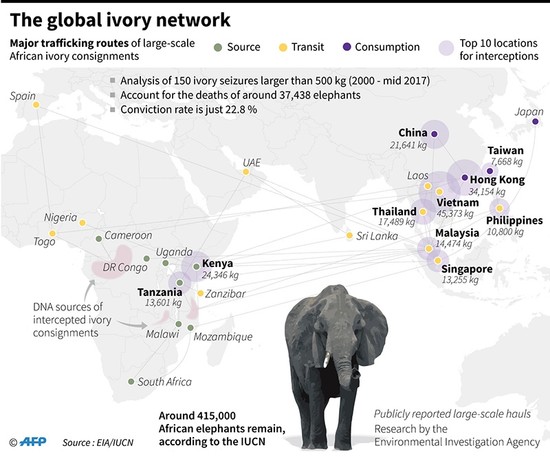© Turkuvaz Haberleşme ve Yayıncılık 2025
A leading American investigator into the illegal ivory and rhino horn trade has been found stabbed to death in his home, Kenyan police and officials said Monday.
A family member went to 75-year-old Esmond Bradley Martin's house in Nairobi suburb of Langata on Sunday to check on him after he did not respond to phone calls and found the body on a bed with a stab wound to the neck, said Nicolas Kamwende, head of criminal investigations in the capital, Nairobi.
Conservationist Paula Kahumbu from the Wildlife Direct said Martin led investigations into the illegal trade of elephant ivory and rhino horn that threatens the two species with extinction.
He was at the forefront of exposing ivory traffickers in the U.S., Congo, Vietnam, Nigeria, Angola, China and recently Myanmar, Kahumbu said, adding that he had been about to publish a report exposing how the ivory trade had shifted from China to neighboring countries.
"A passionate and committed man who made a big difference to our planet. May he rest in peace," British High Commissioner to Kenya Nic Hailey said in a Twitter post.
Conservation group Save the Elephants described Martin as "a longtime ally," a passionate champion of wildlife and meticulous researcher.
Martin was the former U.N. special envoy for rhino conservation.

Illicit demand for elephant ivory has led to devastating losses from illegal poaching as the natural habitat available for the animals to roam has also dwindled by more than half. As a result, the number of African elephants has shrunk from about 5 million a century ago to about 400,000 remaining. And that number continues to decline each year.
Poaching has killed an estimated 110,000 elephants over the last decade, with transnational organized crime syndicates taking over the illicit trade.
The most recent figures, for 2016, showed the illegal ivory market continues to thrive with record ivory seizures despite a decline in poaching.
In addition, less than 30,000 rhinos are estimated to remain in the wild due to poaching.
The price of rhino horn skyrocketed as demand has grown in Asian countries, mainly China and Vietnam, where consumers wrongly believe that the horn made of the same substance as fingernails has powerful healing properties. Syndicates from Vietnam, China, Laos, South Korea and Thailand have been identified as being involved in the trafficking.
In an interview with National Public Radio in 2007, Martin said his greatest contribution academically to conservationism would be to show that except for one small area in India, rhino horn has never been used by Asians for sexual purposes.
Bradley-Martin's research was instrumental in China's decision to ban its legal rhino horn trade in 1993. It also pressured China to end legal ivory sales, a ban that came into force on Jan. 1.
"His work revealed the scale of the problem and made it impossible for the Chinese government to ignore," said Kahumbu.
He is the second prominent conservationist to die in East Africa in the past year. South African Wayne Lotter, whose work targeted ivory smuggling from Africa to Asia, was shot dead in Tanzania in August.
